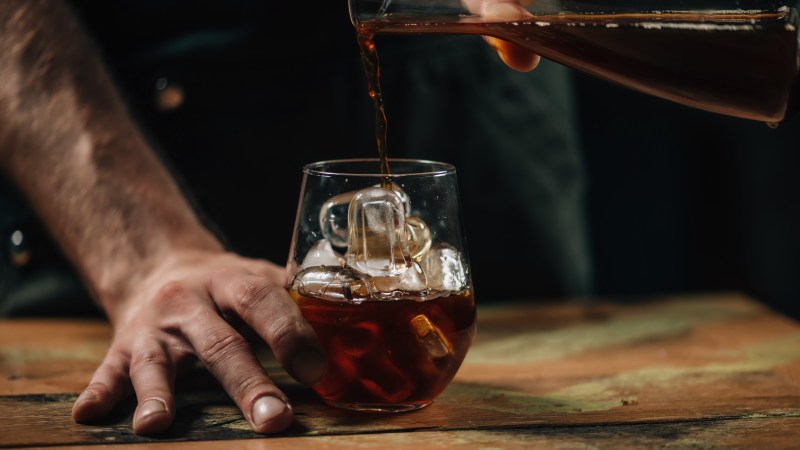The distinctive brewing method of cold brew coffee sets it apart from every other type of coffee out there. Unlike traditional hot drip coffee or even iced coffee, cold brew coffee is brewed at a low temperature over many hours, giving it a truly one-of-a-kind taste. As a coffee connoisseur, I sometimes have to hold back a scoff when people interchange iced coffee and cold brew (they’re really not the same thing). Unlike iced coffee, drinking cold brew offers a variety of unique benefits worth knowing about. These cold brew coffee benefits might just convince you to make the switch.
Cold brew coffee benefits: Taste

I get excited about the benefits of cold brew coffee, but the taste benefits excite me the most. I’ve always enjoyed drinking coffee in any cold form, but iced coffee always seems too bitter (especially when not appropriately made or with poor-quality coffee). To me, the reduced bitterness is one of the greatest benefits of cold brew coffee.
Cold brew coffee is made by steeping coffee grounds in cold water for several hours (usually around 12 to 24 hours). Since cold water is used instead of hot water, the process extracts less oil and acid from coffee grinds, leading to a much less bitter taste. The result: a smoother cold coffee than iced coffee. If you love drinking your coffee cold but find iced coffee too bitter, don’t miss out on trying cold brew.
Easy brewing process and time-saving benefits
Another thing I love about cold brew is how easy it is to make. Despite a long brewing time (which usually requires overnight preparation), preparing cold brew is quite simple. Using a cold brew coffee maker like the Toddy Home Brewing System, you can easily prepare large batches of cold brew concentrate beforehand.
This means you’ll have cold-brew coffee you can sip on all week long without brewing it every morning. If you’re used to hectic mornings with limited free time, preparing cold brew coffee in advance can make your mornings smoother. Cold brew coffee can stay fresh in your refrigerator for up to two weeks when stored correctly in an airtight container.
According to Stone Street Coffee, another benefit of switching to cold brew coffee is its forgiving brewing process. Cold brew coffee can still be great even with beans nearing their expiration date. The cold brewing process filters out accumulated acidity in older coffee beans, making it a resourceful and eco-friendly way to avoid tossing near-expired coffee beans.
Health benefits of cold brew

Many coffee drinkers enjoy a cup of cold brew for its exceptional taste alone, but some also switch to drinking cold brew for the health benefits. Dr. Michael Braun explored what drinking cold brew does for your body. He shared a few health benefits that you may experience by switching to cold brew coffee:
Easier on the stomach
Braun said, “the high acidity of brewed coffee has been known to trigger several different forms of irritation in more sensitive individuals.” This is especially true for those with stomach conditions such as acid reflux, heartburn, and indigestion. In one study, researchers found that cold brew coffee is two-thirds less acidic than traditionally drip (hot) coffee. The lower acidity levels in cold brew may offer a gentler alternative for those with sensitive stomaches.
Cold brew coffee provides a gentler experience for your GI system, and studies suggest that drinking it might also help support it. Cold brew also contains a specific type of carbohydrate known as crude polysaccharides. “These chains of sugar are beneficial to your body because they boost the immunity of your digestive system, thus reducing the chance of gut irritation in response to acidity,” Braun said. Even with less acidity, cold brew coffee still packs in a tremendous amount of caffeine (which means you don’t need to sacrifice an energy boost for stomach upset).
Metabolism boost
Several research studies suggest that the benefits of cold brew coffee may also extend to your metabolism. Cold brew coffee may ramp up your metabolism, allowing your body to burn through its energy stores faster. According to the American Journal of Clinical Nutrition, “The caffeine content found within a cold brew coffee may be enough to boost your metabolic rate by up to 11%. These same effects on metabolism can also be found in hot coffee (which also contains caffeine). However, cold brew coffee tends to be more caffeinated per ounce than drip coffee.
Heart health
Drinking cold brew coffee may also help promote a healthier heart. Research suggests that chlorogenic acids in cold brew coffee act as anti-inflammatory agents, while other compounds like trigonelline, quinines, and lignans can help stabilize blood sugar and lower blood pressure. These healthy benefits and antioxidants found in cold brew coffee may contribute to a lowered risk of heart disease.




